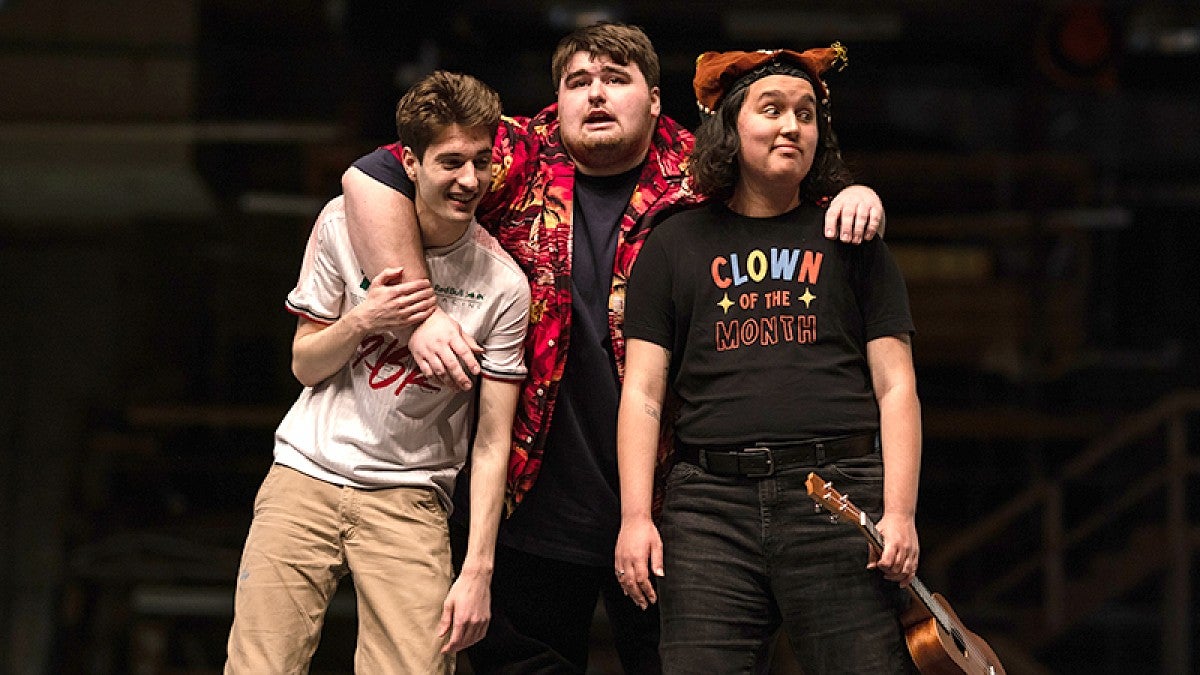University Theater wraps its 2022-23 season with Shakespeare’s last comedy, “Twelfth Night.”
Shows will be May 5, 12, 13, 19 and 20 at 7:30 p.m. and May 14 at 2 p.m. in the Robinson Theatre. Tickets are available at the box office, UO Ticket Office or online; UO students with ID are admitted free.
The play touches on themes of a chaotic world, love and unrequited love, madness, confused gender identity, deception, grief, ambition, melancholy, disguise and death, giving Shakespeare’s tale a timeless quality.
In “Twelfth Night,” a storm at sea separates twins Viola and Sebastian, leaving them shipwrecked and each believing the other has drowned. Knowing that a woman alone is at risk, Viola disguises herself as a young man and using the name Cesario, gets a job as a servant for the Duke Orsino, whom she secretly falls in love with.
However, Orsino is in love with the Countess Olivia, but she is mourning her recently deceased brother and rejects his advances. The Duke sends Cesario/Viola off to court her and that’s when things get really complicated. Olivia falls for Cesario (Viola in disguise) instead. A flood of confusion ensues when Viola’s lost brother Sebastian turns up and mistaken identities are revealed.
Director and theater arts associate professor John Schmor said although the play features many of the comedic elements of Shakespeare’s earlier comedies, the classic comedy in “Twelfth Night” is undermined by grief.
“The separated twins are not just lost,” Schmor said, “they proceed through the play in full grief for the loss of the other. Grief over the recent deaths of both father and brother hangs over Olivia's court as well. Olivia's drunk uncle is a worry to the house as he desperately pursues pleasures and fun.”
Even the love songs, Schmor said “are without exception about the rush of time and ubiquity of loss in living every day.”
In this production, those songs might sound a bit different. After taking Schmor’s Intro to Acting class in the fall, Blaire Ziegenhagel, a second-year doctoral student in music theory, volunteered to compose and perform music as a character known as Musician. Altogether, she wrote 15 different “cues,” including accompaniment lyrics for “Come Away, Come Away Death” and “Wind and the Rain,” and melody and chords for Feste’s song, “O Mistress Mine.”
“There are some other songs as well, but let’s just say that the actors very ‘enthusiastically’ improvise those melodies,” Ziegenhagel said.
“I tried to follow the compositional conventions of the Baroque period, but this proved to be a little bit too difficult with so few instruments,” she said. “I’m in the middle of my doctoral studies in music theory, so I combined that knowledge with a compositional manual written at the time to hopefully make some music that’s close enough so as to not jar people but cinematic enough to be engaging to a modern audience.”
Despite its underlying messages of loss of innocence, revenge and disappointment, Schmor said the play is still very funny.
“The comic happenstances in ‘Twelfth Night’ seem to me married to why we need comedy in the first place,” he said. “We need our revels and flings, our jokes and sad love songs, as we must survive the storms, griefs and confusions of being alive.”
—By Sharleen Nelson, University Communications
—Top photo: From left: AJ Jernigan, Aidan Kent and Cassian Grove rehearse a scene.


